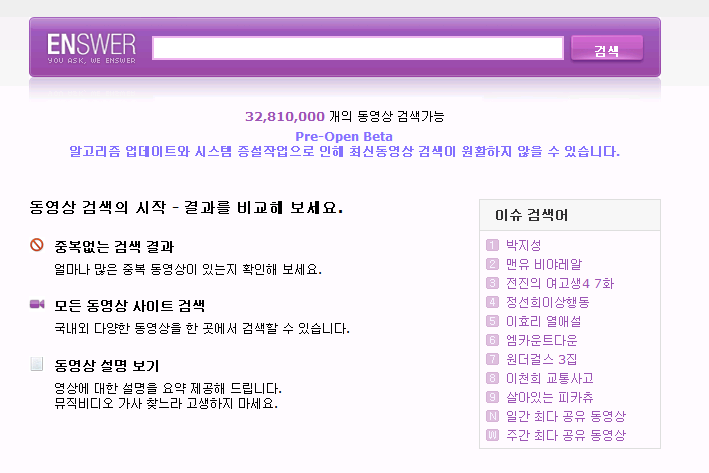3 Articles for 'Enswer'
- 2010/01/28 MBC finally gives in and embraces P2P sharing (2)
- 2009/05/13 Enswer.me seems to have found the holy grail of monetizing online videos
- 2008/09/19 Enswer is the answer to video search (3)
MBC, a major Korean broadcasting company, announced (link in Korean) it will make nearly all of its content available to anyone for sharing. This means any individual or company can freely grab MBC's original content and put it up on their server without any restrictions.
MBC says they are doing this as they are confident they will be able to monetize successfully. End customers who want to download MBC content should pay around KRW 500 per episode (= about half a buck). MBC will collect the revenues from P2P service providers, and has signed agreement with 40 P2P companies. As a way to make sure there is no loophole, MBC will use the technologies that can detect free-riders -- content downloaders who do not pay for the content. There are startup companies, such as Enswer, that can filter out illegally downloaded content.
MBC's new policy can be summed up as: Encourage more sharing/uploading, and monetize at the point of downloading. To me this seems to be a better strategy than what MBC (and all other content owners) have been trying so hard to do in the past, only in vain: Putting heavy penalties to content uploaders, in a hope such measure will scare people away. But the problem is, many of the content uploaders turn out to be 16-year highschool students, who may not be aware of all the laws and regulations, nor are easily scared in general.
MBC says they are giving the new system a try until March this year.
Enswer.me seems to have found the holy grail of monetizing online videos
Web 2.0 | 2009/05/13 12:43 | Web 2.0 Asia
In this Youtube era, people upload TV content on the web literally the minute after programs are aired. Content owners are almost frantic to chase after those non-copyright uploaders and delete their uploaded content. But it often ends up being a mere hide and seek game, as for every deleted piece, there is always another piece of the same content getting uploaded. Also, content deletion leads to a bad user experience, as people often see the image of a video, click on it, and end up seeing "This content has been deleted due to the request of the original owner" sign.
Back to the Boys Over Flowers. The content owners of Boys Over Flowers knew that their program would be put up on the internet in no time, and their effort to hunt down the illegal uploads would be simply not enought. So intead they worked with Enwer.me, a video startup (which I covered in my previous post), to search the user-uploaded Boys Over Flowers content on Daum and Cyworld, and put relevant ads.
Content owners, instead of relentlessly chasing after user uploaded content and deleting them, could generate fresh ads revenue -- the more users upload content, the more money content owners make. Enswer's video search technology enabled such targeted video ads, and anyone would agree that this would be a far better way to monetize video content than banning user uploads and restricting the viewing experience to those channels that the content owners have direct control over. Job well done.
One key reason Google has become the 8000-lb gorilla it is now is, I believe, the company had a truly great piece of technology that couldn't be copied easily by competitors. Even in this "extreme programming" era where rapid development is the name of the game and apps are being churned out in mere days if not hours, technology still matters.
In that philosophy, Enswer is the hidden gem of the Korean web industry. In a nutshell, Enswer is the newest video search engine based on image fingerprinting technology. Today's typical video search engines perform search based on the text metadata associated with videos, so they should actually be called text search. But Enswer is different, as it indexes videos based on, well, the videos - i.e. the actual video content.
As Enswer runs on image/video recognition technologies, it knows which different videos contain the same content, and so it can cluster them together. This can make the world of difference to users, just as Gmail did with its messages clustering feature. Trying to find Beatles music videos? Enswer gives you different "clusters" of Beatles videos, so you can find many different Beatles videos on one screen; Try the same thing on other video searches and you will get all sorts of videos with the metadata "Beatles", all mixed up together, many of them being redundant.
Perhaps the biggest commercial potential of Enswer is more contextual video ads. Right now, video ads are put up based on, again, text metadata (such as "category" information of the video clip). But with Enswer, you can for example insert ads on new game software only on the videos that actually contain gaming-related content.
Enswer has so far indexed more than 32 million videos and are looking at adding 1 million new videos per day, according to their blog. The company has recently raised a venture funding of an undisclosed amount. I will cover them more closely when they come up on stage on the upcoming Demo Day.
TAG Enswer



